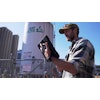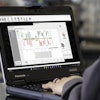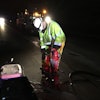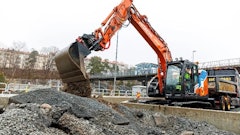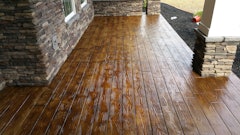A recent study sponsored by the American Glass Bead Manufacturers’ Association reveals that a growing number of imported glass bead products for highway markings exhibit high concentrations of heavy metals, including arsenic and lead. The findings of the study, which was conducted by Texas A&M University’s Texas Transportation Institute (TTI), were presented Feb. 14 at the American Traffic Safety Services Association’s (ATSSA) 41st Annual Convention and Traffic Expo in Phoenix, AZ.
The study found that imported glass beads had extremely high levels of arsenic and lead and were susceptible to rapid leaching with exposure to water. The high levels of these heavy metal substances pose a hazard to highway worker safety and an environmental threat in terms of runoff into the soil, surface water, and drinking water, according to the association.
The trade group notes that glass beads manufactured by companies in emerging nations, particularly China, continue to use glass made from old glass-making techniques which require chemical modification resulting in products containing high levels of arsenic and lead.
U.S. producers, onj the other hand, use environmentally-friendly materials such as recycled flat glass to make their glass beads which do not contain high levels of arsenic and lead. These glass bead products are primarily used for highway safety markings, providing the light-reflective lane markings found on highways around the world.
“These findings are consistent with results from a recent New Jersey Institute of Technology/Rowan University study and also confirm what our membership has known to be true for some time,” said Robert McClune, president of the American Glass Bead Manufacturers’ Association. “Based on overwhelming scientific evidence and now the results from the TTI and the New Jersey Institute of Technology/Rowan University studies, it’s time for state and federal transportation officials and lawmakers to act and establish a federal standard for engineered glass beads in highway markings and prevent these hazardous substances from being applied to our roads and highways.”
Over the past several years, the association has worked to raise awareness of the issue, citing the need to hold all manufacturers to higher quality standards and as a result deter the use of these products and protect the environment and highway worker safety. Setting a heavy metals standard for glass beads has gained strong support from environmental groups such as the Sierra Club, state and federal lawmakers, and unions such as the International Union of Operating Engineers.
A total of 19 states have now adopted laws or regulations that require the use of environmentally-friendly, non-toxic materials in the production of glass beads for highway markings. This same issue is gaining traction globally with the European Union, Australia, New Zealand, and several Canadian provinces already setting similar standards. China, a major source of these questionable glass beads, has also set strict heavy metal standards for internal use but continues to export contaminated glass bead products to other nations, according to the association.
Professional Pavement Products Offers Dynamic Weather Monitoring Tool
Professional Pavement Products, Jacksonville, FL, has made its weather-based DAF Scale available in real time, nationwide at www.dafscale.com.
The DAF (Driskell Application Factoring) Scale tracks locally forecasted weather points to assist contractors in determining the best days and times to apply sealer and paint, enabling them to increase productivity while reducing risk and even assist in extending the application season.
Using a proprietary formula developed by Greg Driskell, PPP president, the DAF Scale analyzes several critical weather factors needed for successful application of sealer and pavement marking paint and translates them into a simplified, color-coded rating of 1 to 10.
Driskell says the DAF Scale has been tested widely in the field for more than two years and has proven to be accurate and reliable. Until recently it was previously available only to PPP customers located in the six cities PPP has warehouse outlets and six additional cities customers had voted for online.
Volvo to Centralize U.S. Operations in Pennsylvania
Volvo Construction Equipment plans to spend $100 million in its North American operations and bring its regional sales and rental activities to Shippensburg, PA. The move includes starting production of Volvo wheel loaders, excavators and articulated haulers in North America.
“It makes sense, when possible, to manufacture products close to where our customers are,” said Olof Persson, president and CEO of Volvo Construction Equipment. “The global demand for Volvo construction equipment is rapidly increasing and we need to make investments to meet future demands in the region. Producing Volvo wheel loaders, articulated haulers and excavators in Shippensburg will result in shorter lead times for our customers. We will work closely with local suppliers to increase the North American content of our products. This will further reduce our exposure to exchange rate fluctuations, which will already be positively affected by our bringing more production to the USA.”
Also, the Volvo CE North American sales headquarters and Volvo Rents will relocate from Asheville, NC, to Shippensburg by September 2012. Volvo will construct a new office building to house the sales and rental operations and training center and will construct a Customer and Demonstration Center in Shippensburg.
?


